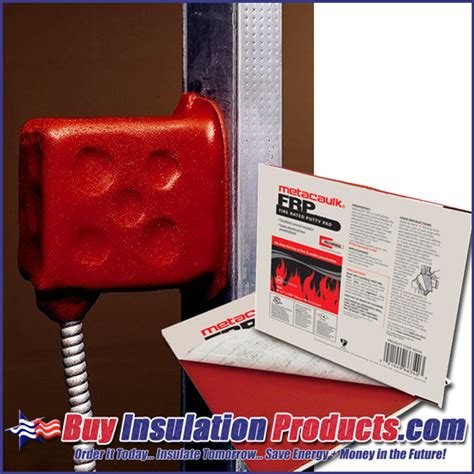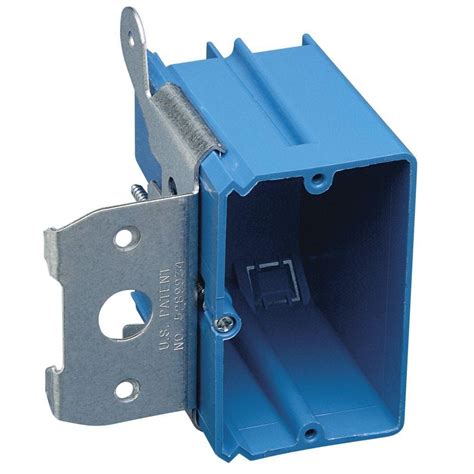electrical boxes that dont need puddy pads There are different PADs, some are for sound some for Fire rating. I don't think 1 will cover a box that size you may need more than 1 per box. Someone has pointed to this . Drivers in Richmond have paid more than two million pounds in fines at yellow box junctions in the borough since 2016. At the junction between Castelnau with Trinity Church Road almost 7,000 penalty charge notices were issued in 2018, raking in nearly half a .
0 · what is a putty pad
1 · putty pads in fire rated wall
2 · non metal electrical boxes
3 · non metal electrical box inserts
4 · fire rated electrical box
5 · electrical outlet boxes
6 · electrical box inserts
Mid-sized contemporary yellow two-story metal exterior home idea in London with a metal roof and a black roof
Most non-metallic electrical boxes require 24” horizontal separation between boxes on opposite sides of a wall if they are not protected with putty pads. Please reference Table 2 on Page 4 for specific approvals for non-metallic electrical .SLIDERBOX® Adjustable Electrical Boxes • The 1099-AB is listed for 2HR fire resistive walls. • fiberglassBOX® material, so no putty pad is needed when following the Uniform Building Code . The GC is now telling is that some of the boxes in fire rated walls require putty pads. I have seen the code (NFPA maybe?) that describes that a box that is over 16 square .
There are different PADs, some are for sound some for Fire rating. I don't think 1 will cover a box that size you may need more than 1 per box. Someone has pointed to this .
One way to prevent boxes from reducing the wall’s fire rating and thus meet the IBC performance requirement is by using putty pads or other listed materials. Putty pads are not a requirement for back boxes installed within masonry walls although penetrating cables through the wall need to be considered. For the best protection and putty pad installation, there are . Metacaulk Fire Rated Putty Pads: These stick "play dough" like pads are installed to the back of an electrical outlet to provide proper fire stopping to the outlet penetration. Unfortunately these pads are limited to new .
You could use an inside-box putty pad, something like this: http://www.firetherm.com/pictures/82/20091125181321522297366.pdf I've had to do a ton of .Most non-metallic electrical boxes require 24” horizontal separation between boxes on opposite sides of a wall if they are not protected with putty pads. Please reference Table 2 on Page 4 for specific approvals for non-metallic electrical boxes.SLIDERBOX® Adjustable Electrical Boxes • The 1099-AB is listed for 2HR fire resistive walls. • fiberglassBOX® material, so no putty pad is needed when following the Uniform Building Code (3" minimum distance between boxes). • Sound rated up to . The GC is now telling is that some of the boxes in fire rated walls require putty pads. I have seen the code (NFPA maybe?) that describes that a box that is over 16 square inches (which applies, in some cases we used oversized boxes), a 100 square foot area, etc, etc and I have also seen literature from STI, Hilti and 3M on this.
There are different PADs, some are for sound some for Fire rating. I don't think 1 will cover a box that size you may need more than 1 per box. Someone has pointed to this document where it states that the box can only be 16 sq inches not the opening.
what is a putty pad

One way to prevent boxes from reducing the wall’s fire rating and thus meet the IBC performance requirement is by using putty pads or other listed materials. Putty pads are not a requirement for back boxes installed within masonry walls although penetrating cables through the wall need to be considered. For the best protection and putty pad installation, there are various methods available on the market.
piezas torno cnc
Metacaulk Fire Rated Putty Pads: These stick "play dough" like pads are installed to the back of an electrical outlet to provide proper fire stopping to the outlet penetration. Unfortunately these pads are limited to new construction as the . You could use an inside-box putty pad, something like this: http://www.firetherm.com/pictures/82/20091125181321522297366.pdf I've had to do a ton of boxes in rated walls, but never a cut in box. The pads are now used primarily to overcome certain restrictions on the number and placement of electrical boxes in rated gypsum wallboard assemblies. How are they used? Putty pads, as mentioned above, are designed to be applied to the external surfaces of metallic and nonmetallic boxes.
Putty pads are designed to be applied to the external surfaces of metallic and nonmetallic switch and receptacle boxes in some rated wall conditions. We also have used putty pads in a few systems for through-penetrations. Let’s discuss the electrical box usage first and then cover their use in through-penetration firestops.Most non-metallic electrical boxes require 24” horizontal separation between boxes on opposite sides of a wall if they are not protected with putty pads. Please reference Table 2 on Page 4 for specific approvals for non-metallic electrical boxes.SLIDERBOX® Adjustable Electrical Boxes • The 1099-AB is listed for 2HR fire resistive walls. • fiberglassBOX® material, so no putty pad is needed when following the Uniform Building Code (3" minimum distance between boxes). • Sound rated up to .
putty pads in fire rated wall
The GC is now telling is that some of the boxes in fire rated walls require putty pads. I have seen the code (NFPA maybe?) that describes that a box that is over 16 square inches (which applies, in some cases we used oversized boxes), a 100 square foot area, etc, etc and I have also seen literature from STI, Hilti and 3M on this. There are different PADs, some are for sound some for Fire rating. I don't think 1 will cover a box that size you may need more than 1 per box. Someone has pointed to this document where it states that the box can only be 16 sq inches not the opening.
One way to prevent boxes from reducing the wall’s fire rating and thus meet the IBC performance requirement is by using putty pads or other listed materials. Putty pads are not a requirement for back boxes installed within masonry walls although penetrating cables through the wall need to be considered. For the best protection and putty pad installation, there are various methods available on the market.
Metacaulk Fire Rated Putty Pads: These stick "play dough" like pads are installed to the back of an electrical outlet to provide proper fire stopping to the outlet penetration. Unfortunately these pads are limited to new construction as the .
You could use an inside-box putty pad, something like this: http://www.firetherm.com/pictures/82/20091125181321522297366.pdf I've had to do a ton of boxes in rated walls, but never a cut in box. The pads are now used primarily to overcome certain restrictions on the number and placement of electrical boxes in rated gypsum wallboard assemblies. How are they used? Putty pads, as mentioned above, are designed to be applied to the external surfaces of metallic and nonmetallic boxes.

non metal electrical boxes


pikachu metal lunch box
piedmont metal fabricators inc
What are the rules for a box junction? 1. Do not enter a box junction unless the exit road is clear. 2. Only stop in the box if you’re turning right and waiting for a gap in traffic. 3. If the traffic lights go red before you turn, you’re .
electrical boxes that dont need puddy pads|non metal electrical box inserts